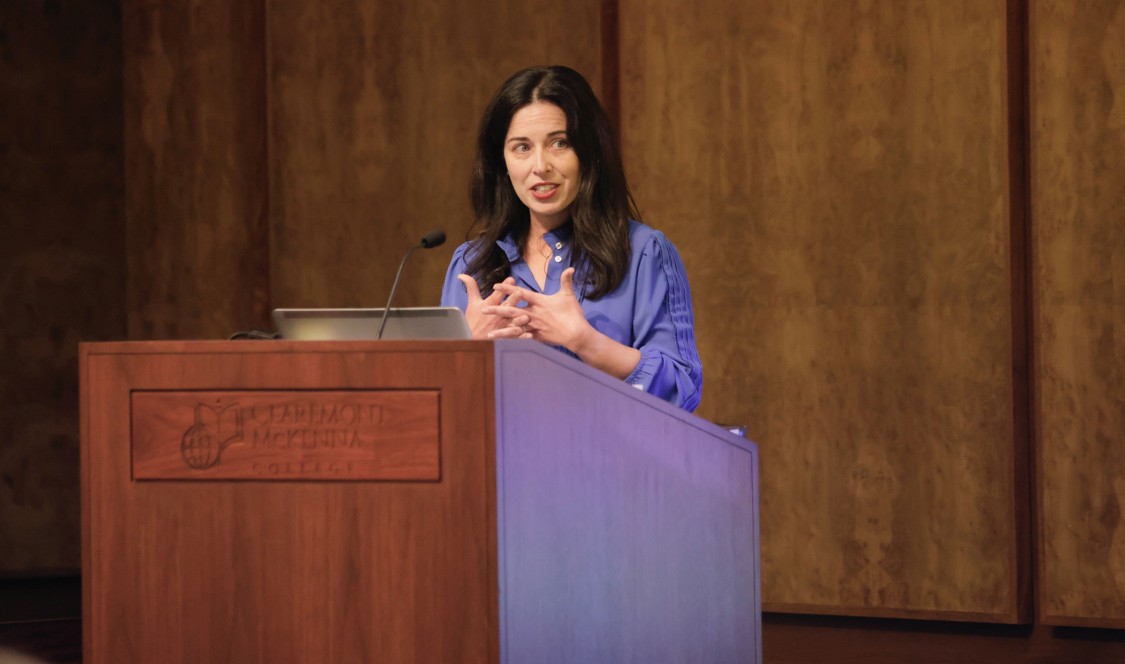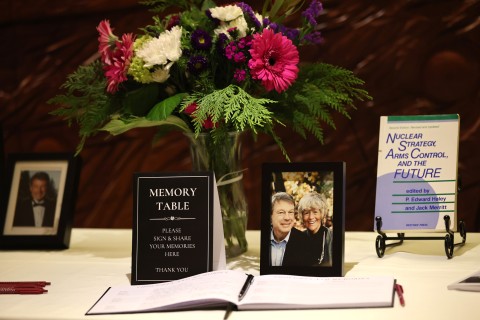
Photos by Sidney Smith ’25
Story by Anne Bergman
December 6, 2023
On a crisp autumn evening at Claremont McKenna College’s Athenaeum, Professor P. Edward “Ed” Haley was remembered as a teacher and scholar who for nearly 50 years brought the world into his classroom, through his depth of experience and knowledge, as well as his appreciation for the arts.
Reflecting and honoring the late Professor Haley’s impact on the CMC community, the Nov. 28 memorial at the Athenaeum was filled with fond memories, poetry, and a scholarly lecture, “Threats and Promises Across the Nuclear Age,” by Professor Lisa Koch, co-sponsored by the Keck Center for International and Strategic Studies and the Mgrublian Center for Human Rights.
Heather Antecol, Vice President of Academic Affairs and Dean of the Faculty, began by recounting how Haley “was an invaluable mentor and professor to more than four generations of CMC students and a key figure in the development and promotion of CMC’s International Relations program, and in the founding of two CMC research institutes,” the Keck Center for International and Strategic Studies, and the Mgrublian Center for Human Rights (formerly the Center for the Study of the Holocaust, Genocide, and Human Rights).
Antecol noted the care that Haley, who passed away in June 2023 at the age of 83, paid to “his colleagues and his students, many of whom remained lifelong friends once they became alumni, joining advisory boards, attending programs and visiting campus to keep in touch with him” during his time at CMC, which began in 1968 when Haley joined the CMC Government faculty.
Hilary Appel, director of the Keck Center for International and Strategic Studies and Podlich Professor of Government, overlapped with Haley at CMC for approximately 15 years. Appel highlighted how Haley’s teaching “reflected his deep humanity and compassion,” “his curiosity for the world,” and ”passion for learning.”
Appel explained how the evening’s academic lecture by Professor Lisa Koch, who specializes in international relations, on “Threats and Promises Across the Nuclear Age,” was a topic “closely related to Ed’s research and teaching interests.” Koch, Appel said, represents “the continuation of the kinds of programs that Ed started here because she is teaching many of the courses that Ed introduced to our curriculum many years ago.”
This year, Koch published her first book, Nuclear Decisions: Changing the Course of Nuclear Weapons Programs. In addition, she’s the author of scholarly articles on nuclear proliferation and foreign policy.
Kirsti Zitar ’97 P’26, assistant director of the Mgrublian Center, lived across the street from Haley and his wife, Elaine, in Claremont and worked with Haley from 2011 until his retirement in 2014.
Zitar shared her own personal memories of Haley, and observed how Haley worked “tirelessly to help ensure the Center’s long-term viability and to provide opportunities that offered the greatest impact to CMC students,” such as study abroad and internship programs. Upon Haley’s retirement in 2014, an endowed internship was established by the Mgrublian Center’s advisory board in his name. The P. Edward Haley Internship attracts students studying conflicts and human rights issues in the Middle East, and allows them to travel there in the summer.

Haley’s daughters, Blythe Nilsson and Kate Haley, concluded the tribute by reading some of their father’s favorite poetry, as well as his own self-published poems, which Nilsson described as addressing “the duality of beauty and suffering in this world.”
Ath Fellow Adrian Flynn ’25 introduced Professor Koch’s in memoriam lecture after describing Haley as an “Ath aficionado” who spoke at the Athenaeum’s current location 15 times. Flynn noted that Koch was making her first appearance at the Ath podium.
Before she began her Ath lecture, Koch paid tribute to Haley and his legacy, saying that while she did not meet Haley in person, she felt as though she got to know him “through his writings. That’s how scholars get to know each other. It’s through our work. And so, I get to enter into conversation with Ed as I read and engage with his works. I brought his book, Strategies of Dominance, with me tonight…. It’s a great example of Ed’s scholarship. It is pragmatic, it is clear-eyed, it is grounded in historical case studies. And it is forward-looking, policy-focused, and tinged with optimism.”
Speaker Quotes
“For this talk, in Ed’s honor, I chose the topic of nuclear threat, as that was important during Ed’s long career, and has generated renewed interest today,” Koch said. “Because of declassified documents, and the work of historians and political scientists, we know more now than we used to about how nuclear threats and promises have played out across the nuclear age.”
Koch then detailed the history of nuclear weapons, their use and escalation, as well as the diplomatic efforts that have averted nuclear warfare.
This current “renewed interest” in nuclear threats, Koch explained, “is due in large part to Russian leader Vladimir Putin’s nuclear threats, which he has made in the context of the Russian war in Ukraine.”
Koch then shared the content of a speech Putin delivered in 2020, in which he did not use the word “nuclear,” but which Koch interpreted as a threat to use nuclear weapons. “You don’t even need to use the word (nuclear) to inspire the fear,” she continued. “Why are these veiled threats so scary? It is because nuclear weapons are so scary.”
Student Question
Daniela Brun Matar, a sophomore at CMC studying international relations and psychology, asked, “How does public perception of nuclear weapons change the way we talk about nuclear weapons over time? I especially wonder if you think that the release of the movie Oppenheimer has changed the way we view nuclear weapons?”
Koch replied that is “a question that I’ve asked in different ways in some of my research. I think there are generational differences in how the public perceives nuclear weapons, their meaning, their threat. I think that because each successive generation knows less about what the weapons can do, that people may treat the possibility of the use of nuclear weapons more cavalierly than they should, or not take them as seriously as they should. ….And I do think the movie Oppenheimer could be somewhat of a corrective to that, on the margins. I think that while the movie is not perfect, it is based on a scholarly biography that’s been sitting on my shelf for years. …And I think that people who’ve seen this movie…, who are getting their introduction to nuclear weapons by seeing this movie, they do come away with the respect that I think is healthy to have.”
